If you’re a realtor looking to boost your online presence and stay ahead in today’s competitive market, building an IDX real estate website is the game-changing move you need to make.
Did you know that having an IDX real estate website can significantly impact your business? According to recent statistics, real estate agents with IDX websites experience a substantial increase in leads and conversions.
In fact, realtors with integrated IDX solutions witness an average of 54% more leads compared to those without one.
Not only have that, but a staggering 89% of homebuyers started their property search online, emphasizing the importance of having a strong virtual real estate storefront.
In this blog, we’ll guide you through the process of building your very own IDX real estate website. From choosing the right development team and IDX integration option to designing a captivating interface and optimizing for search engines, we’ll cover it all.
Therefore, with this being said, let’s get right into it, starting with:
Understanding IDX Website For Realtors

(Internet Data Exchange) IDX real estate website is a powerful tool that allows you to display up-to-date MLS (Multiple Listing Service) property listings directly on your website.
It enables potential buyers to search for properties, view detailed listing information, and connect with you for inquiries. Think of it as your virtual real estate storefront, attracting clients and showcasing your expertise.
All in all, this type of custom website development is super powerful. But if you are wondering how it works and what it does, then let’s discuss just that in the next section of the blog.
What Does IDX Real Estate Website Do?

So, what do a real estate IDX website actually do?
Your IDX real estate website acts as a hub for property listings, providing a seamless browsing experience for potential clients.
When visitors come to your website, they can search for homes based on their preferences, such as location, price range, property type, and more.
Moreover, the IDX integration ensures that the listings are regularly updated from the MLS, so clients get access to the latest available properties.
Once users find properties that catch their eye, they can view detailed information, high-quality images, virtual tours, and even schedule showings directly through your website.
And the website captures leads by offering registration forms, enabling you to nurture potential clients and build lasting relationships.
In essence, your IDX real estate website becomes a one-stop-shop for house hunters, empowering them to explore properties conveniently while positioning you as a knowledgeable and valuable resource in the real estate market.
With this out of the way, let’s discuss whether or not your real estate business need an ISX real estate website.
Should You Develop An IDX Real Estate Website?
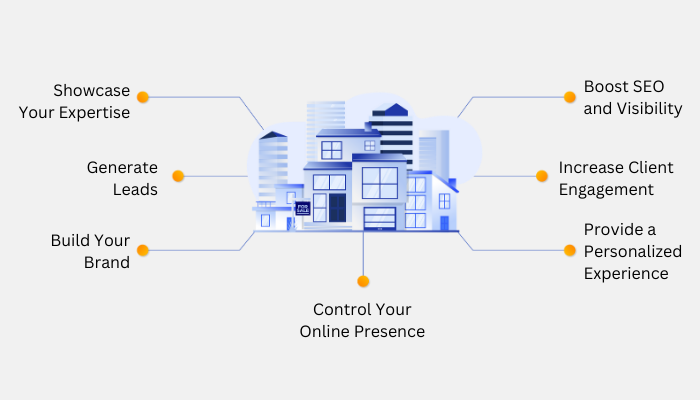
Having an IDX real estate website is a game-changer for your business. It sets you apart from competitors and strengthens your online presence.
But do you actually need it? To decide just that, let’s see what an IDX website for realtors can do for you.
- Showcase Your Expertise: Displaying MLS listings on your website demonstrates your access to comprehensive real estate data and positions you as a trusted source of information for buyers.
- Generate Leads: The lead capture forms on your website allow you to gather valuable contact information from potential clients, giving you the opportunity to follow up and nurture those leads.
- Build Your Brand: A well-designed IDX real estate website with your branding creates a strong professional image, helping you stand out and build brand recognition in your local market.
- Control Your Online Presence: Instead of relying solely on third-party listing platforms, your IDX website gives you control over your online presence and allows you to showcase your personality and unique value proposition.
- Provide a Personalized Experience: Customize your website to cater to your target audience’s preferences, creating a personalized experience that resonates with potential buyers.
- Increase Client Engagement: Your IDX websites for realtors becomes a platform for engagement, where clients can explore properties, contact you for inquiries, and receive updates on new listings through email alerts.
- Boost SEO and Visibility: An active and content-rich real estate website with IDX can improve your search engine rankings, making it easier for potential clients to discover you online. Making marketing that much easier.
Best IDX Real Estate Websites To Learn From
Well, if you want to build IDX real estate website, there’s something that you can learn from these best real estate websites.
1. IDX Real Estate Website From Real Geeks
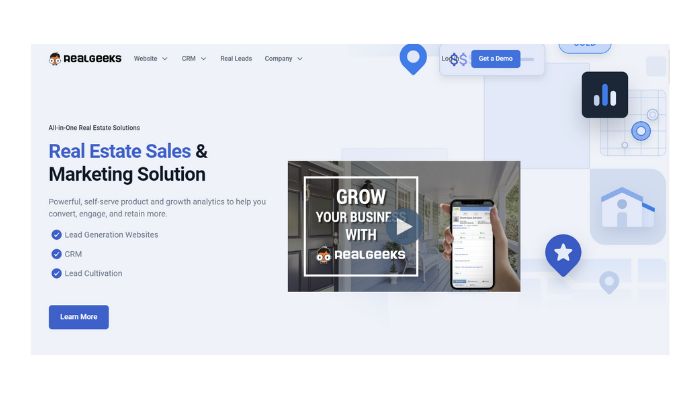
Welcome to the Real Geeks, where simplicity meets power.
This IDX website packs a punch with its user-friendly interface and advanced lead generation tools. Get ready to convert visitors into happy homeowners effortlessly.
2. Agent PRO
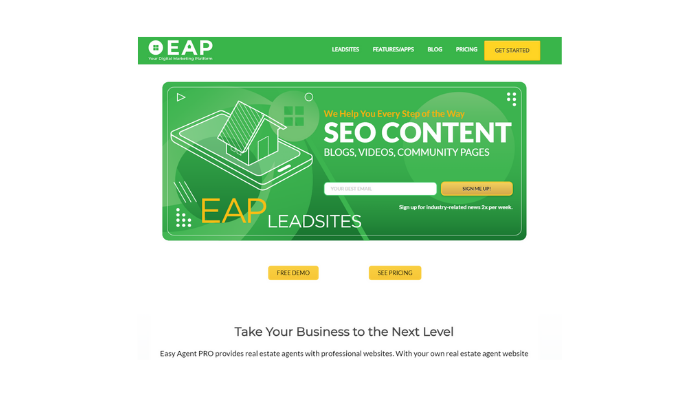
Agent PRO is your secret weapon to success. With its sleek design and customizable features, you can showcase your listings like a boss and attract clients like never before.
3. AgentFire
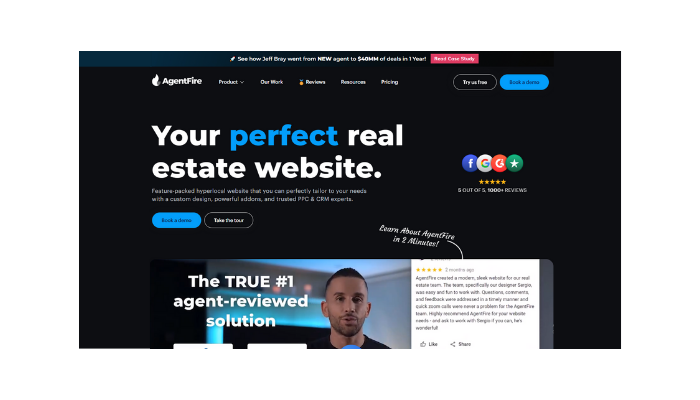
Get ready to ignite your real estate game with AgentFire. This IDX website is all about eye-catching visuals and top-notch performance. Set your brand on fire and watch it spread like wildfire.
4. Placester
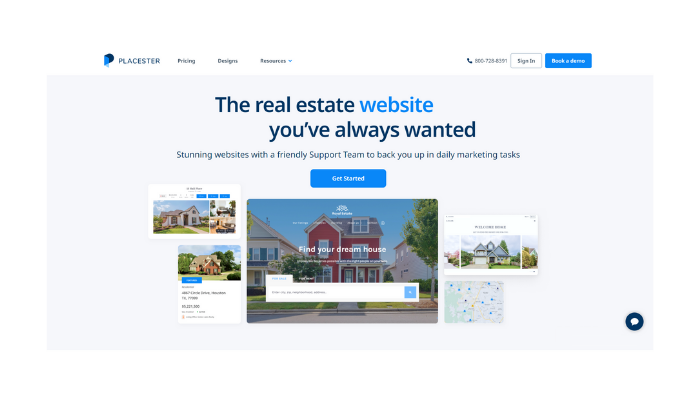
Step into the world of Placester, where aesthetics and functionality collide. From elegant templates to lead capture tools, this IDX website has everything you need to make a lasting impression on potential buyers.
5. BoomTown
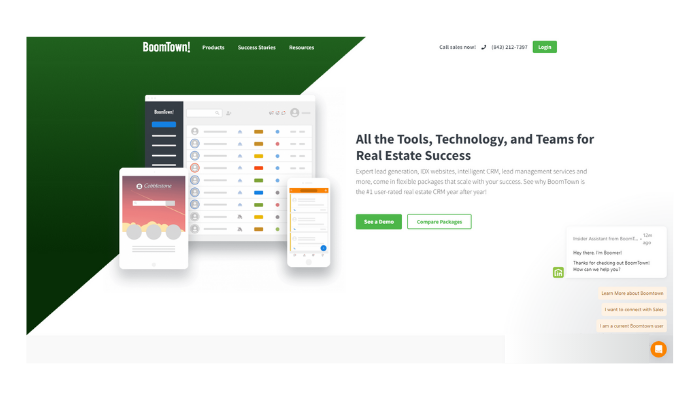
BoomTown is the party central for real estate agents. With its robust lead generation system and CRM integration, you’ll be dancing your way to more closed deals and happy clients.
6. iHomefinder
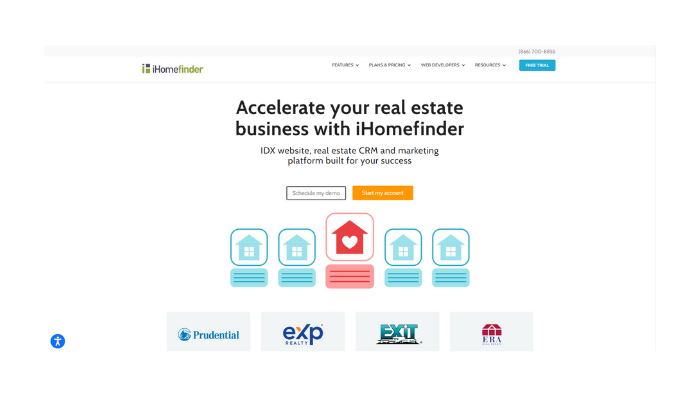
Welcome to iHomefinder, your one-stop-shop for IDX solutions.
This IDX Real Estate Website offers a seamless property search experience and customizable widgets to fit your unique brand. Say hello to satisfied clients and booming referrals.
7. Sierra Interactive
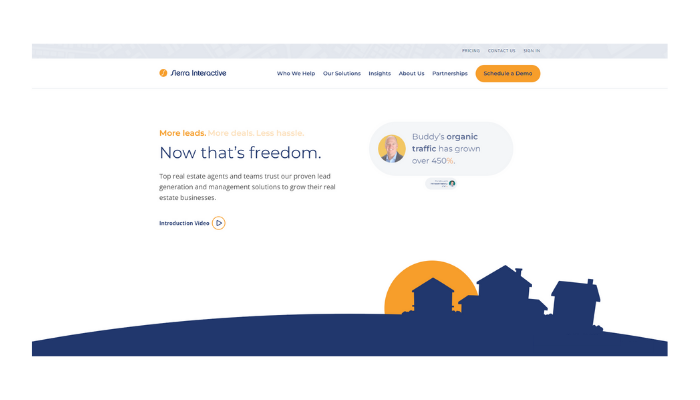
Hey, trendsetter. Sierra Interactive is the epitome of modern elegance. This IDX website is perfect for agents who want to make a statement and stand out from the crowd. Prepare to wow your audience.
8. Propertybase
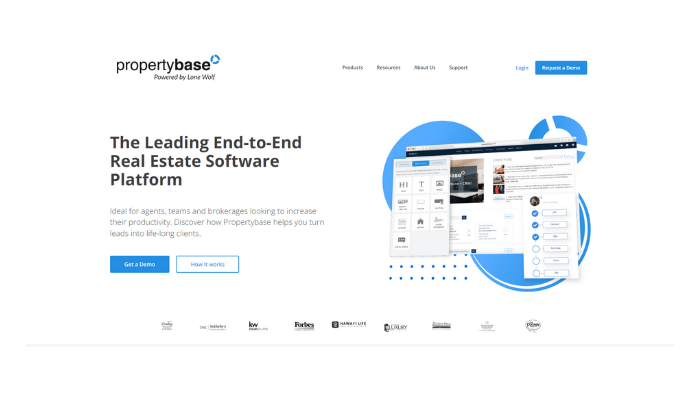
Step into the realm of Propertybase, where efficiency and style coexist. This IDX real estate website’s CRM integration and lead management tools will keep you organized and on top of your game.
9. kvCORE
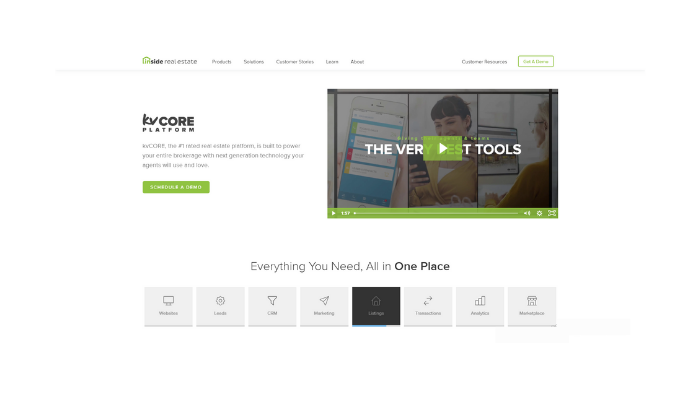
Calling all tech-savvy agents. kvCORE is your tech playground, offering cutting-edge AI-driven features and lead nurturing tools. Get ready to level up your real estate business like never before.
10. Brivity
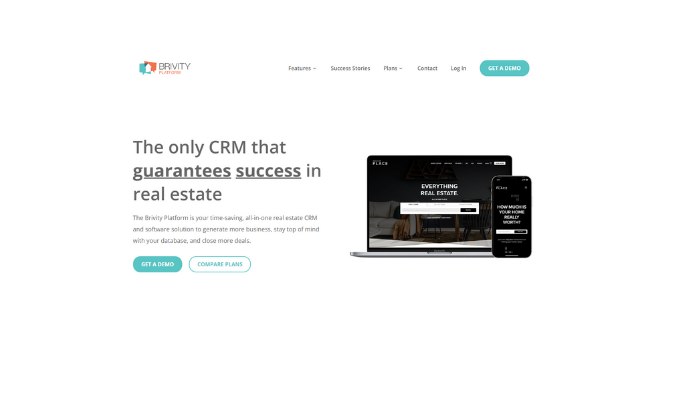
Brivity is here to simplify your real estate life. With its intuitive interface and automation features, you can focus on what matters most – connecting with clients and closing deals with a smile.
11. Chime
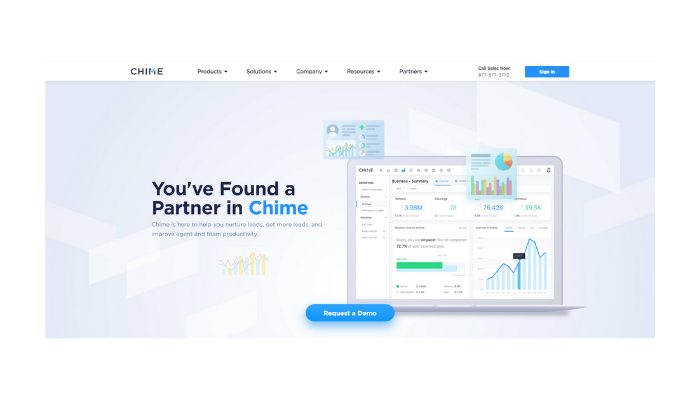
Chime in, real estate rockstar. Chime’s all-in-one platform offers IDX, CRM, and marketing tools to supercharge your productivity. Say goodbye to juggling multiple tools and hello to a seamless workflow.
IDX Integration Option for Real Estate Website Development
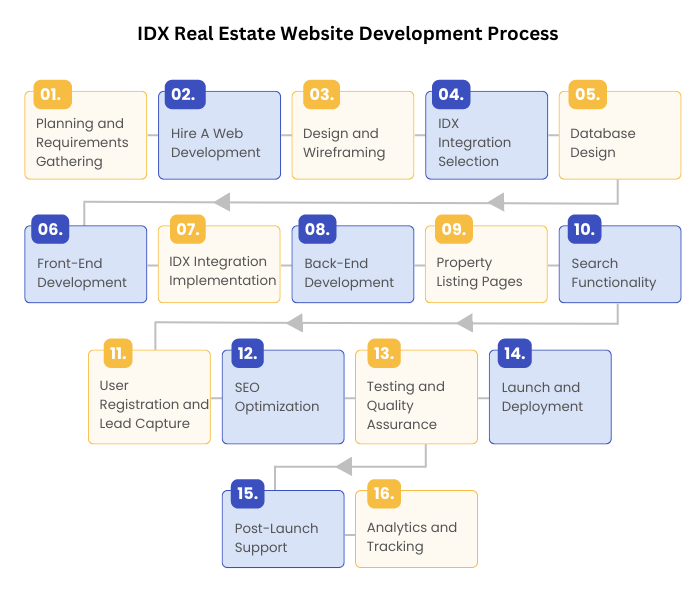
Now, if you are developing a custom IDX real estate website, you need an IDX integration.
Well, depending on the project there are a lot of different options, let’s go through these before we get into the process to build a IDX website.
Therefore, with this being said, let’s get right into it:
WordPress IDX Plugins:
- dsIDXpress (by Diverse Solutions)
- IMPress for IDX Broker (by IDX Broker)
- Optima Express (by iHomefinder)
- Realtyna IDX (by Realtyna)
- Showcase IDX (by Showcase IDX)
Website Builders with Built-in IDX:
- Wix Real Estate
- Squarespace with IDX Broker Integration
- Weebly with Diverse Solutions IDX
Custom IDX Integration (API):
- Developers can integrate IDX data using MLS-provided APIs and custom coding.
Real Estate CRM and Marketing Platforms:
Some CRM and marketing platforms offer built-in IDX capabilities, streamlining lead management and marketing efforts. Examples include Chime, Real Geeks, and kvCORE.
IDX Widgets and iFrames:
Some IDX providers offer widgets or iFrames that you can embed into your website to display property listings. Examples include IDX Broker and iHomefinder.
Custom IDX Solutions:
Some web development agencies specialize in creating custom IDX solutions tailored to your specific needs and preferences.
IDX API Aggregators:
These services gather data from multiple MLSs and provide a single API for developers to integrate into their websites. Examples include Estated API and RETS Rabbit.
Now, with this out of the way, let’s get right into the real estate website development in the section below.
IDX Real Estate Website Development Process
It’s time to create a custom IDX real estate website for your realtors. Here, we shall go through the entire process to develop the IDX websites for realtors.
Therefore, with this being said, let’s get right into it:
1. Planning and Requirements Gathering
First, you need to define your website’s goals, target audience, and specific features you want to offer. For that, you have to gather requirements from real estate agents, brokers, or potential users to understand their needs.
2. Hire A Web Development
Select a reliable web development team or hire experienced web developers with expertise in real estate websites and IDX integration.
3. Design and Wireframing
Create wireframes or mockups to visualize the website’s layout, user interface, and user experience. Design a visually appealing and intuitive interface that aligns with your brand.
4. IDX Integration Selection
Choose the IDX real estate website that best fits your requirements ( we discussed the option in previous section). And work closely with the IDX provider to ensure a smooth integration process.
5. Database Design
Design the database architecture to efficiently store and manage property listings, user data, and other relevant information.
6. Front-End Development:
Develop the front-end of the website using HTML, CSS, and JavaScript. Implement responsive design to ensure optimal performance on various devices. This is also known as the real estate website design part.
7. IDX Integration Implementation
Integrate the chosen IDX solution into the website. This involves connecting to the MLS data feed, setting up search filters, and displaying property listings.
8. Back-End Development
Build the back-end of the website using a server-side programming language like PHP or Python. Implement data processing, user authentication, and lead capture functionalities.
9. Property Listing Pages
Create dynamic property listing pages that display detailed information, high-quality images, virtual tours, and other relevant content.
10. Search Functionality
Implement advanced search features, allowing users to filter properties based on location, price range, property type, and more.
11. User Registration and Lead Capture
Integrate user registration and lead capture forms to gather potential client information. Implement lead management features to organize and track leads.
12. SEO Optimization
Optimize the website for search engines by incorporating relevant keywords, meta tags, and schema markup to enhance search visibility.
13. Testing and Quality Assurance
Thoroughly test the website’s functionality, performance, and usability. Conduct QA testing on different devices and browsers to ensure a seamless user experience.
14. Launch and Deployment
Prepare the website for launch on a reliable web hosting server. Monitor the website closely during the launch phase.
15. Post-Launch Support
Provide ongoing support and maintenance to address any issues that arise after the website goes live. Regularly update the website to ensure optimal performance and security.
16. Analytics and Tracking
Integrate analytics tools to monitor website traffic, user behavior, and lead generation. Use data insights to make informed decisions and improvements.
Now, with the entire IDX real state website development out of the way, it’s time to discuss the cost to build one.
Cost To Build A Real Estate Website
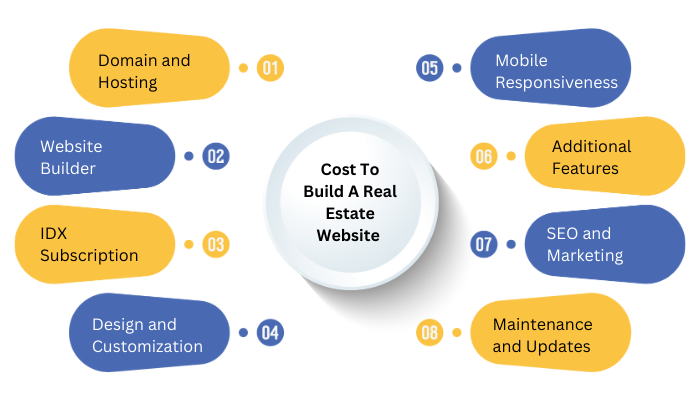
So how much does it cost to build IDX real estate website? Well, web development cost depends on a lot of different things.
Therefore, to provide a good understanding of how costing work, let’s look at different aspects and how they affect the cost.
· Domain and Hosting
First things first, you’ll need a domain (your website’s address) and hosting (where your site lives). Expect to spend around $10 to $20 per year for a domain, and hosting can set you back anywhere from $5 to $30 per month, depending on your chosen provider and plan.
· Website Builder
Now comes the fun part – choosing a website builder. WordPress is a popular choice and can be budget-friendly since it’s free. Plus, there are IDX plugins available (some free, some with a price tag) to integrate MLS listings into your site. Budget around $0 to $200 for the website builder and plugins. If you go for custom web development, well, that’s a different story.
· IDX Subscription
Ah, the heart and soul of your real estate website – the IDX data. You’ll need a subscription to an IDX provider to access those juicy MLS listings. Prices can vary, but plan on shelling out around $30 to $100 per month.
· Design and Customization
Want to stand out from the crowd? Consider investing in some cool website design and customization. This could involve hiring a web designer or using premium themes and templates. Set aside around $200 to $1,000 for these pimp-my-site options.
· Mobile Responsiveness
In this mobile age, you can’t forget about making your site mobile-friendly. Luckily, most website builders have responsive designs built-in. But hey, don’t forget to double-check. This step should be free, but it’s crucial.
· Additional Features
Feeling fancy? You can add extra features like mortgage calculators, interactive maps, or virtual tours to wow your visitors. Some plugins and tools come with a price tag, so allocate around $50 to $500 for these little website upgrades.
· SEO and Marketing
What’s the point of a fantastic website if nobody can find it? Invest in SEO (Search Engine Optimization) to boost your website’s visibility on search engines like Google. Also, consider setting aside some cash for online marketing campaigns to attract potential clients. Budget around $100 to $500 per month for this digital dance.
· Maintenance and Updates:
We can’t forget about the ongoing costs of maintaining and updating your website. This includes plugin updates, security measures, and regular backups. Plan to spend around $20 to $50 per month to keep your site in tiptop shape.
Grand Total
Drumroll, please. The estimated cost to build your rockin’ IDX real estate website comes to approximately $400 to $2,500 upfront, with monthly expenses ranging from $150 to $280.
However, when it comes to custom web development, it can cost anywhere between $10,000 and $20,000 based on the project specification.
Now, If you want more detailed on the same, it’s highly recommended that you consult real estate solution development company.
Conclusion
This is all you need to know about IDX real estate website development. And with this out of the way, it’s time to conclude our blog.
FAQ
IDX (Internet Data Exchange) is a system that allows real estate agents to display MLS property listings on their websites, providing visitors with up-to-date property information.
You’ll need a domain, hosting, a real estate website builder, an IDX plugin, and an MLS subscription to access property data.
Look for website builders tailored to real estate, like WordPress with IDX plugins, Wix, or Squarespace, to easily integrate IDX functionality.
After choosing a compatible IDX plugin, follow the installation instructions provided by the plugin developer to integrate IDX into your website.
Yes, IDX data is typically updated regularly from the MLS, ensuring that the property listings on your website remain current.
Yes, most IDX plugins allow you to customize the display of property listings to match your website’s design and branding.
Yes, modern IDX solutions are designed to be responsive and mobile-friendly, providing a seamless user experience on various devices.
Basic knowledge of website building and WordPress is helpful, but many IDX plugins offer user-friendly interfaces that don’t require advanced coding skills.
Yes, with IDX, visitors can save their property searches, set up email alerts, and receive notifications about new listings matching their criteria.
Yes, as an IDX website owner, you must comply with MLS rules, copyright laws, and data usage guidelines to avoid legal issues.
Utilize digital marketing strategies like SEO, social media promotion, and content marketing to attract potential clients to your IDX real estate website.
Yes, you can enhance your website by adding features like mortgage calculators, neighborhood information, virtual tours, and other tools to engage visitors.
While not mandatory, having a blog can boost your website’s SEO, establish you as a knowledgeable agent, and provide valuable content to attract potential clients.
Use a CRM (Customer Relationship Management) system to organize and follow up with leads, turning potential clients into satisfied home buyers or sellers.
Yes, you can provide bilingual support by incorporating multilingual plugins or offering content in multiple languages to cater to a diverse audience.

Niketan Sharma is the CTO of Nimble AppGenie, a prominent website and mobile app development company in the USA that is delivering excellence with a commitment to boosting business growth & maximizing customer satisfaction. He is a highly motivated individual who helps SMEs and startups grow in this dynamic market with the latest technology and innovation.
Table of Contents












No Comments
Comments are closed.